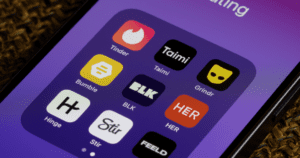This Post Breaks Down the Nonprofit Dating App Fantasy the Atlantic Explored—And What the Collective Conversation Missed
As dating apps have become the go-to way for people to meet and connect, so has public skepticism. The excitement of swiping often turns into frustration and burnout. Many dating-app users begin to look at their experiences and might think, “Is this app actually helping me, or just trying to keep me single?”
This rising doubt has given birth to a radical concept: the nonprofit dating app—a platform that doesn’t try to make money but instead focuses on genuinely helping people find love, friendship, or a meaningful platonic connection. Let’s explore the truth behind this growing movement and what it means for the future of online dating.
1. Dating Apps Often Prioritize Profit Over People
Most dating-app companies are businesses first. Their mission is to grow revenue, and they do this by turning what should be a personal experience into a data-driven funnel designed to make users stay longer, swipe more, and spend frequently.
One example is Match Group, which owns Tinder, Hinge, and Match.com—three of the largest apps on the market. In one 2024 study, researchers found that many users believed the apps were manipulating their matches, limiting profile visibility, and pushing “boost” purchases to enhance their chances of being seen. These features that give a shred of hope are designed not to help people leave the app but to keep them coming back.
This creates what scholars have called a “conflict of interest.” Users want to find a partner and then delete the app. Companies want customers to stick around, sign up for subscriptions, and remain part of the commercial setting.
2. Most Platforms Aren’t Built on Real Relationship Science
The problem isn’t just greed—it’s also a lack of understanding about how human relationships work. While some apps have researchers on staff, they’re often constrained by short-term business goals.
As Bruch told The Atlantic, for-profit tech firms rarely have the time or flexibility to complete a whole research project. A CEO can decide at any moment to pivot, abandoning initiatives that don’t deliver immediate profitable results.
In one 2017 study, researchers attempted to build an algorithm based on over 100 variables to predict romantic compatibility. It didn’t work. That’s because the algorithm can’t yet capture chemistry, shared values, or emotional readiness—things we know from experience truly matter.
3. Revel Is Testing a New Model: Science Over Sales
Working on Revel is a bold experiment from University of Michigan researchers Elizabeth Bruch and Amie Gordon. Their app is a scientific study—“for science”, not profit. According to Revel’s website, their goal is to understand how people make decisions and what helps them truly connect.
Here’s how Revel is different:
- It collects behavioral data to understand user preferences.
- It focuses on seeing who matches, then following up continuously with pairs who met in person.
- It tests theories like “choice overload”—how seeing many profiles can reduce decision-making quality.
- It explores whether seeing more information about someone leads to better matches.
Instead of profit, their job is discovery. That means they can provide insights that benefit users, not shareholders.
4. A Nonprofit Dating App Builds Trust Through Transparency
One of the most frustrating parts of current platforms is the mystery. Users often don’t understand how matches are made, why someone disappears, or whether the app is hiding their profile unless they pay.
A nonprofit dating app doesn’t have to hide anything. It can openly share how the algorithm works, who you’re shown, and why. It doesn’t rely on shady upsells or manipulative tactics.
This level of transparency is something most dating apps lack. In fact, many users rarely read the cookie policy or privacy policy because they don’t expect honesty from platforms trying to turn a profit—meddling in their emotions to increase screen time.
With nonprofit apps, trust becomes a key feature—not an afterthought.
5. What Users Want From Dating Apps
If we listen to many dating-app users, their frustrations sound familiar. They’re tired of gimmicks, gamification, and shallow swiping. What they want to know is whether the app is truly designed to help them succeed.
Here’s what users consistently say they want:
- A chance to meet someone serious—or someone who matches their type of connection, whether a short fling, friendship, or lifelong love.
- Less time wasted on profiles that are irrelevant or incompatible.
- More clarity around how matching works and how to improve results.
- Platforms that don’t make them feel like a customer but like a valued user.
Ironically, users often blame themselves—“Maybe you’re too picky,” or “I just have bad luck.” But often, the system is built for engagement, not outcomes.
6. The Ethical Opportunity for Founders and Startups
There’s a huge opportunity for startups, researchers, and even ethical brands to step in and build something better. As The Magnetic Collective suggested, when profit motives clash with user goals, no amount of engineering can fix it.
Instead, ethical companies can:
- Develop tools that prioritize emotional well-being.
- Offer apps that allow users to update your choices without penalty or manipulation.
- Embrace transparency, not just in marketing but in algorithm design and user feedback loops.
- Build platforms that are secure, data-conscious, and easy to leave when a connection is made.
In short, we need apps built by people who care about courtship, not just clicks.
7. Reimagining the Future of Online Connection
The idea of a nonprofit dating app is about more than just removing fees. It’s about rethinking the entire experience of online connection. It’s asking: What if the right people weren’t filtered out by an ad budget or swiping metric? What if finding love wasn’t something you had to pay for?
Imagine a platform that:
- Helps people explore meaningful relationships with fewer distractions.
- Is open-source or supported by universities or non-profit organizations.
- Doesn’t just optimize engagement, but user happiness.
- Encourages real off-app outcomes, not infinite swiping.
This isn’t a utopia. It’s a direction worth pursuing—and one that smart, ethical teams are already starting to build.
Final Thoughts: Why This Fantasy Matters
In a digital world where most platforms are engineered to exploit attention, a nonprofit dating app feels like a breath of fresh air. It reminds us that technology can be built around people, not profits. That trust can be part of the product—not a luxury. And that dating apps don’t have to be addictive to be effective.
There will always be room in the market for quick flings and fun swipes. But for those who want something deeper—a connection that’s honest, intentional, and perhaps even backed by science—the nonprofit model might be the best path forward.
The tools already exist. The research is underway. The mission is clear.



